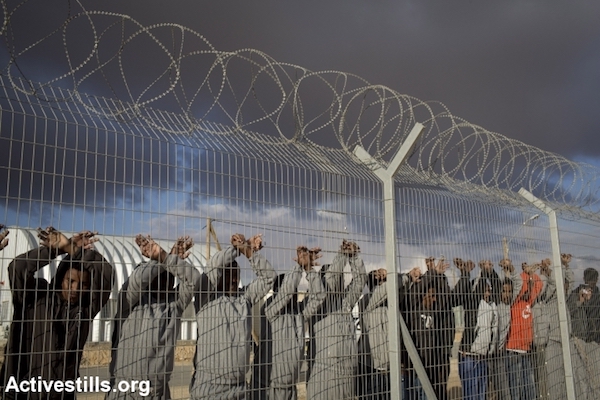Israel’s ‘Holot’ detention facility for asylum seekers, which is intended to rob them of so much hope that they’ll leave the country, refuses to provide Hebrew lessons as part of its education program for detainees. The result is empty classrooms and a parallel, asylum seeker-run program.
By Omri Du-Nour

Israel’s desert detention facility for asylum seekers, “Holot,” has been controversial ever since it was first opened four years ago. The primary aim of the facility, as declared by then-Interior Minister Eli Yishai, who initiated its construction, was to drive African asylum seekers to a state of despair, so that they will choose to leave Israel voluntarily. Since then, Israel’s High Court of Justice ordered the facility to provide for the basic needs of those detained there, which includes the right to education.
Educational services at Holot are operated by the Israeli Education Ministry (through its department for adult education) but the programs it offers are rather limited and do not meet the most substantive needs of the detainees. The state is spending hundreds of thousands of shekels a year on educational and enrichment programs but it ignores the asylum seekers’ biggest and most critical need: Hebrew language studies. What’s so objectionable about a few thousand detainees learning Hebrew each year?
The answer is wrapped up in the policies Israel adopted ever since it began addressing the issue of African asylum seekers in a coherent manner: trying to get them to leave the country any way possible. The Holot detention facility is part of that effort. Israeli authorities believe that in order to advance that goal they should provide detainees with tools to help them “make it” in other countries — not in Israel. Therefore, the state opposes providing them with Hebrew lessons as part of the educational programs it runs at Holot. Instead, it provides them with English and mathematics courses — important fields of study, but not ones that meet the demands and basic needs of the detainees there.
The absurdity of the situation, which I have experienced over the past couple of years as a teacher in Holot, is that on the one hand Israel wants and expects the detainees to come to classes and participate in the educational programs it organizes for them. On the other hand, Israeli authorities systematically ignore the detainees’ desire to improve their Hebrew while at Holot, something that comes up over and over again in conversations and meetings between those running the facility and those forced to live there.
Israel is making great efforts at understanding the detainees’ needs (or at least it says that’s what it is doing), but in practice it ignores their basic needs. At the same time, it acts surprised by the small number of detainees (a small percentage, by my rough estimate) who actually attend the classes it provides. It’s like a company that refuses to recognize its customers aren’t interested in buying its faulty or unattractive products, instead stubbornly insisting that the customers themselves are the problem.
The double absurdity is that most of the detainees at Holot (based on my personal acquaintance with them) have been in Israel for many years. They arrived in Israel without knowing any Hebrew but in order to survive and make a living they had to attain at least a basic command of the language. The longer they are here, the better their Hebrew gets. Being held at Holot itself improves their Hebrew even further because most of the guards and staff speak only Hebrew. Paradoxically, just being held in the detention facility is providing the detainees with the thing Israeli authorities least want to provide: strengthening the ability of asylum seekers to remain in and integrate into Israeli society by improving their Hebrew-language skills.
At the same time, the detainees understand the situation for what it is and have organized independent Hebrew learning groups for themselves — they built a parallel education system. The disconnect and distrust that the detainees feel vis-à-vis Israeli authorities is only growing, and the programs the state provides them with are completely ineffective.
As somebody who has become familiar with the system from the inside over the past two years, I have to say that it’s basically a fraud: Israel does indeed invest massive sums in educational programs at Holot but the intended beneficiary isn’t the detainees themselves or their actual needs. The programs are intended as a PR fix for the bad reputation Holot has recived since it first opened four years ago. Israeli authorities’ desire to improve conditions there has more to do with mitigating criticism of Holot’s very existence — and the thin line it occupies with regards to international law, the 1951 Refugee Convention, and Israel’s own Basic Laws.
Instead of being surprised time and again by the asylum seekers’ lack of motivation to attain an education while held at Holot, Israel needs to change its policies: either allow Hebrew-language studies, investing the necessary resources and massively increasing the number of students at the detention facility or acknowledge the ineffectiveness of its educational programs and admit to its failures.
Israel’s stubborn refusal to provide Hebrew lessons to the asylum seekers at Holot is not what is stopping the detainees from integrating into Israeli society. That’s not what is standing in their way. It is also not what will convince them to leave Israel. Let’s call a spade a spade.
Omri Du-Nour is an educator and for the past two years has taught English at the Holot detention facility. This article was first published in Hebrew on Local Call. Read it here.

